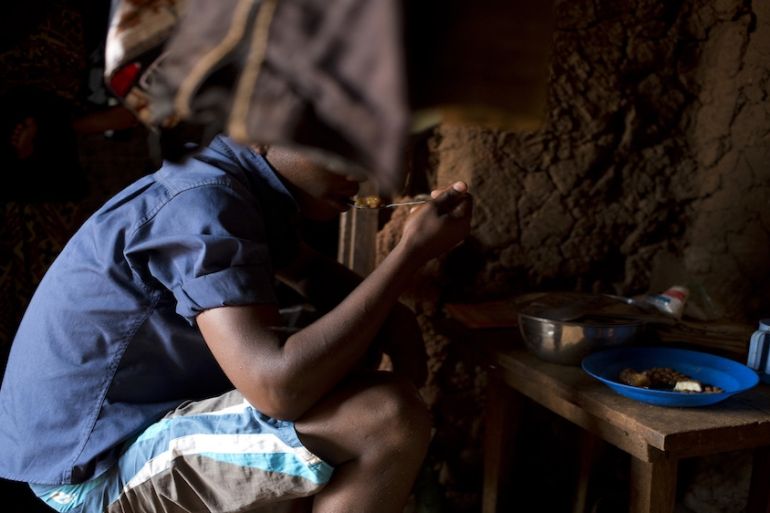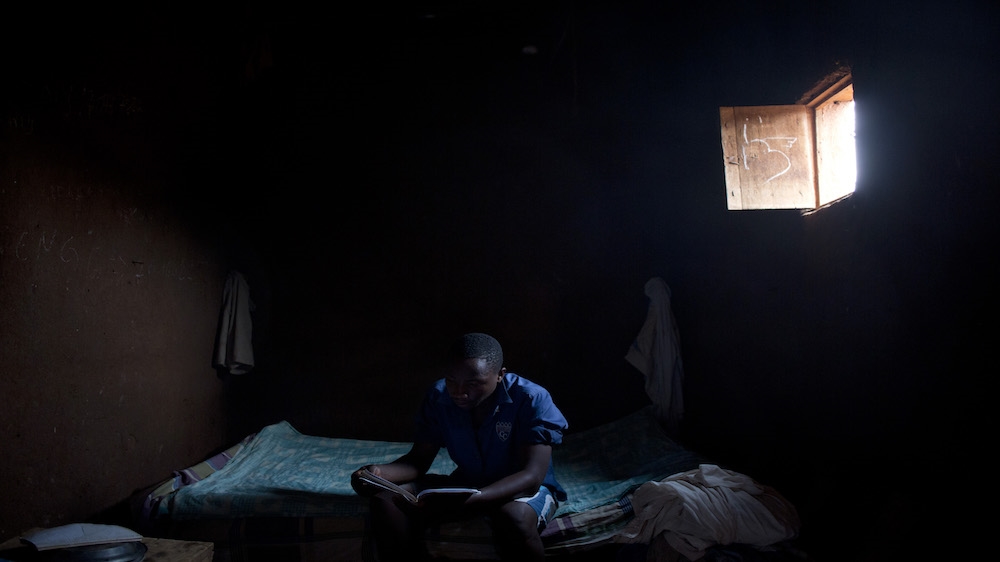Reintegrating child soldiers in Burundi
Can children forced to fight be reintegrated back into their families and communities?

Busoni, Burundi – Jean-Pierre* is almost indistinguishable in the blur of schoolchildren. Only as he approaches, among a group of boys, clasping a book to his chest, does his unusually immaculate uniform come into focus.
It is bright and clean, bearing no trace of the torrential afternoon downpour in Busoni, Burundi, that has sent capillaries of rainwater racing across the playground.
Keep reading
list of 4 itemsPalestinian Prisoner’s Day: How many are still in Israeli detention?
‘Mama we’re dying’: Only able to hear her kids in Gaza in their final days
Europe pledges to boost aid to Sudan on unwelcome war anniversary
The 17-year-old waves on his friends and hangs back, slowly breathing in air that tastes of mud. “I was so afraid that I would die,” he says softly, once the last of his classmates has disappeared. “I thought about my family and I was afraid that I would never see them again.”
Jean-Pierre is one of an unknown number of children from the East African nation of Burundi who were forced to become fighters after a political crisis broke out last April.
So far, more than 400 people have died in violence, while more than 260,000 have fled to neighbouring countries as refugees.
Children are bearing the brunt of the conflict as the economy nosedives and large portions of international aid are suspended, severely impacting access to social services such as healthcare, education, water and sanitation.
One day in March 2015, a stranger offered Jean-Pierre a job in a shop. Coming from a desperately poor family, and with debts to repay, he agreed. Hours later he found himself in a forest, surrounded by men in military uniforms.
“I was tricked,” he says. “I felt so bad inside. This man had lied and told me that he would give me a good, honourable job.”
‘I was scared’
Jean-Pierre says there were about 100 children in the forest training camp he was taken to – some as young as 10. Other children UNICEF have spoken to have confirmed this.
There, they were taught how to handle guns. Those judged the most skilled were given weapons to carry. Others, like Jean-Pierre, became porters and cooks for the fighters.
“I was scared and I said to the others, ‘Let’s flee’,” Jean-Pierre remembers. “But they were afraid [the fighters] would find us.”
“I missed my family most of all.”
After weeks of gruelling training, last July the children were forced to participate in an offensive in Kayanza in northern Burundi. Some were armed; others just carried equipment for the older fighters. The children report witnessing people being killed but can’t say how many for sure.
“It was awful for me to see,” says Jean-Pierre. “Sometimes at night I think about the children who were with me. I feel very afraid and I am really sad that so many things changed in my life, and there are so many people I have lost, and so much time …”
The children who had been forced to participate in the attack were surrounded by governmen troops and all 58 were eventually transported to Rumonge Central Prison, charged with involvement in armed groups. The conditions there were poor – the children had little to wear, no beds to sleep on and only one meal a day.
“We were held alongside adults and it was very difficult. They wanted us to drink and to take drugs. We had to work out how to avoid them,” Jean-Pierre says.
READ MORE: Can talks lead to peace in Burundi?
Nearly 300 children have been detained during Burundi’s political crisis – on charges ranging from involvement in armed groups to participation in protests.
Bo Viktor Nylund, UNICEF’s Burundi representative, visited the boys in prison on October 2, 2015, along with the Minister of Justice, Aimee Laurentine Kanyana.
Soon after, the boys were moved to a re-education centre for children in detention, one of two opened with UNICEF support in early 2015, just before the crisis broke out. There they were provided with regular meals, dormitory beds, a structured schedule that included recreational time for football and other games and access to social workers and psychologists.
“Many things changed at the re-education centre,” says Jean-Pierre. “There was better food. We could play football, drums.”
Still, he dreamed of being able to go home to his family.
After a presidential pardon, the children were released on November 30, 2015.
But their freedom did not guarantee an end to their ordeal. Children who have been forced to fight often face rejection and abuse by their families and communities once they return home.
 |
| Jean-Pierre, 17, sits on a bed in his home in the district of Busoni in Burundi [UNICEF/Prinsloo] |
Before the children were released, UNICEF and its local partners tried to make sure that this wouldn’t happen. They identified the children’s families and provided psychological support for the children and their relatives. In addition, they ensured that local child protection committees in their home areas were ready to provide active support on their return.
Each child received a three-year school scholarship and a special reintegration pack, containing a new school uniform, exercise books, a backpack and food such as beans and oil.
Once back in their communities, the children received visits from a specialist social worker once or twice a week. They now visit once a month. Still, many are struggling to readjust, and several boys say they have been threatened.
“These children have experienced both horrifying violence and arbitrary detention,” says Leila Gharagozloo-Pakkala, UNICEF’s regional director for eastern and southern Africa. “No child should be exposed to this. All parties in the country’s political crisis must act now to ensure the safety of all children.”
Jean-Pierre is one of the luckiest of his group. He has terrible nightmares, but his family is overjoyed to have him home and the rest of the community has provided a similar welcome.
“I was so happy to see my son come home,” says Esperance, his mother. “I was so worried when I heard he was imprisoned.”
Now Jean-Pierre spends his free time playing football with friends he had assumed he would never see again. He continues to contemplate his experience, through regular sessions with his social worker and by keeping in touch with other boys who are also trying to reintegrate. Sometimes he borrows his brother’s Bible to pray – not to forget, as he did in the forest, but to concentrate his mind.
Back in class, with his education paid for three years, Jean-Pierre has ambitions to become a doctor.
“Being in school gives me the chance to become someone new,” he says. “It is like I have been cleansed of my history and my new life is like a dream.”
*Name has been changed